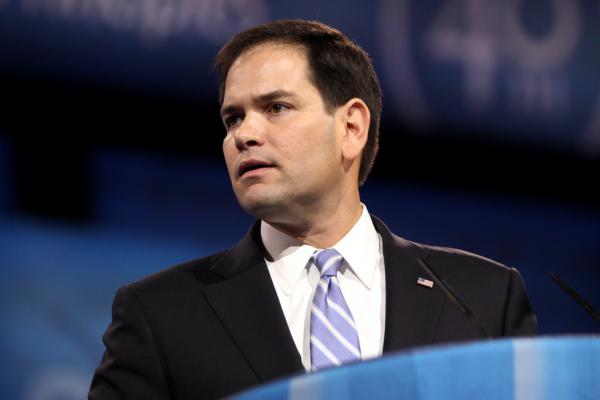Why is it so difficult for some people to respond to climate change in a thoughtful way? Sen. Marco Rubio says he doesn’t believe human activity is causing changes to the global climate. He told ABC News: “I do not believe that human activity is causing these dramatic changes to our climate the way these scientists are portraying it, and I do not believe that the laws that they propose we pass will do anything about it, except it will destroy our economy.”
But if Sen. Rubio believes that humans aren’t causing climate change, who does he believe is? Does he believe that climate change is natural, perhaps an act of God? The senator is a Christian , and he would be wise to listen to the words of a variety of religious leaders who have spoken about care for creation.
Pope Francis has repeatedly voiced concern about climate change, including this passage from his recent apostolic exhortation: The Joy of the Gospel:
“We human beings are not the beneficiaries but the stewards of other creatures. Thanks to our bodies, God has joined us so closely to the world around us that we can feel the desertification of the soil almost as a physical ailment, and extinction of a species as a painful disfigurement.”
In addition to the Pope, Evangelical pastors also support caring for the earth. Mitch Hescox, president and CEO of the Evangelical Environmental Network, recently told the Christian Post:
"There will be whole peoples who will be unable to adapt to the way we are polluting God's creation. Especially those living on some Island nations and those in parts of the world where adaptation will be too expensive to implement." He added. "Christians have a responsibility to know the stories of those who are and will be impacted by climate change throughout the world and where possible intervene."
Franciscans have long been known for their admiration of God’s creation, which is an issue that the organization I lead, the Franciscan Action Network, advocates for on Capitol Hill. St. Francis of Assisi recognized God’s work and the beauty of God in creation, and loved God all the more for this gift. Francis saw an intimate relationship between Christ and all of creation. He saw the divine beauty in all of creation and identified every creature from the humans and trees, to the flowers and ants, as his brothers and sisters.
St. Bonaventure, a Franciscan theologian, described the created universe as the fountain fullness of God’s expressed being. As God is expressed in creation, creation in turn expresses the creator. Sen. Rubio’s God must not be one endless love. What kind of a God would create such a beautiful, wondrous creation filled with such awesome beauty only to later change his mind and allow it to be destroyed?
What it is about our nature that allows us to believe it is okay to destroy our planet? Do we not feel “the extinction of a species as a painful disfigurement?” Does Sen. Rubio not see the divine beauty in all of creation? Could it be that we have become so isolated, so focused on the individual that we have lost sight of our connectedness, our relationship to God, and all that God has created?
Strange as it may seem, there is a part of me that is slightly encouraged by Sen. Rubio’s remarks. He has gone from anger and denial of climate change to acceptance and negotiations. So perhaps he is going through what climate scientist Dr. Steve Running describes as five stages of “climate grief:”
- Denial that the Earth is warming and that the warming is caused by humans
- Anger that anyone should suggest that their lifestyle be changed
- Bargaining by suggesting that “it won’t be all bad” (for instance, growing seasons will be extended in some places)
- Depression at the almost unimaginable reality of the problem
- Acceptance, enabling active exploration of solutions
I would offer to the senator and all others who are grieving over the loss of our relationship with the planet, the opportunity to continue the grieving and healing process. I know that members of the Franciscan family would welcome the chance to meet and work with him through the process so we all can get to the point of acceptance and start actively exploring solutions to climate change.
Patrick Carolan is Executive Director of the Franciscan Action Network.
Image: Senator Marco Rubio of Florida speaking at the 2013 Conservative Political Action Conference (CPAC) in National Harbor, Maryland. by Gage Skidmore / Flickr.com
Got something to say about what you're reading? We value your feedback!
